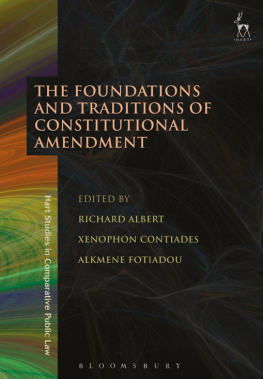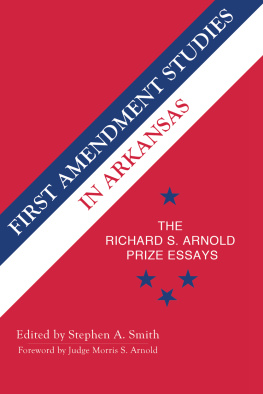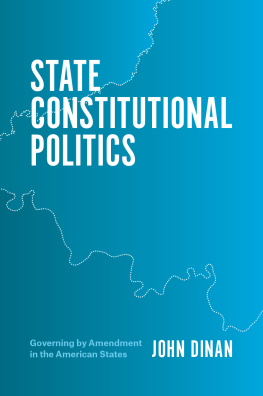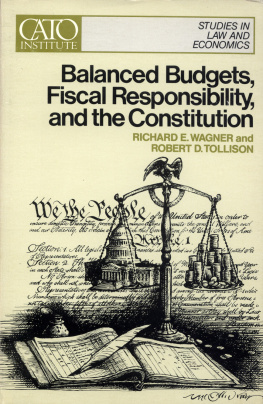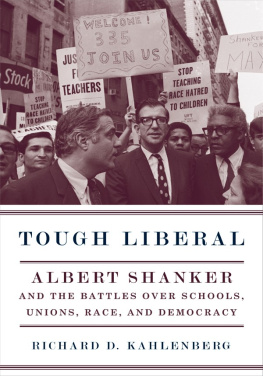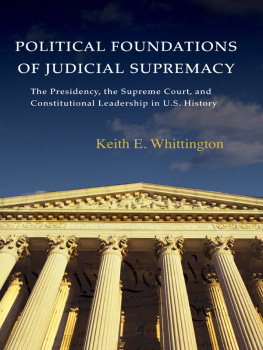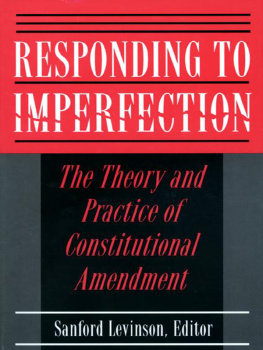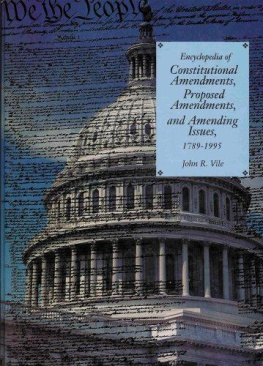Albert Richard D. - The foundations and traditions of constitutional amendment
Here you can read online Albert Richard D. - The foundations and traditions of constitutional amendment full text of the book (entire story) in english for free. Download pdf and epub, get meaning, cover and reviews about this ebook. year: 2017, publisher: Hart Publishing, genre: Politics. Description of the work, (preface) as well as reviews are available. Best literature library LitArk.com created for fans of good reading and offers a wide selection of genres:
Romance novel
Science fiction
Adventure
Detective
Science
History
Home and family
Prose
Art
Politics
Computer
Non-fiction
Religion
Business
Children
Humor
Choose a favorite category and find really read worthwhile books. Enjoy immersion in the world of imagination, feel the emotions of the characters or learn something new for yourself, make an fascinating discovery.
- Book:The foundations and traditions of constitutional amendment
- Author:
- Publisher:Hart Publishing
- Genre:
- Year:2017
- Rating:3 / 5
- Favourites:Add to favourites
- Your mark:
- 60
- 1
- 2
- 3
- 4
- 5
The foundations and traditions of constitutional amendment: summary, description and annotation
We offer to read an annotation, description, summary or preface (depends on what the author of the book "The foundations and traditions of constitutional amendment" wrote himself). If you haven't found the necessary information about the book — write in the comments, we will try to find it.
The foundations and traditions of constitutional amendment — read online for free the complete book (whole text) full work
Below is the text of the book, divided by pages. System saving the place of the last page read, allows you to conveniently read the book "The foundations and traditions of constitutional amendment" online for free, without having to search again every time where you left off. Put a bookmark, and you can go to the page where you finished reading at any time.
Font size:
Interval:
Bookmark:

THE FOUNDATIONS AND TRADITIONS
OF CONSTITUTIONAL AMENDMENT
There is growing interest in constitutional amendment from a comparative perspective. Comparative constitutional amendment is the study of how constitutions change through formal and informal means, including alteration, revision, evolution, interpretation, replacement and revolution. The field invites scholars to draw insights about constitutional change across borders and cultures, to uncover the motivations behind constitutional change, to theorise best practices, and to identify the theoretical underpinnings of constitutional change.
This volume is designed to guide the emergence of comparative constitutional amendment as a distinct field of study in public law. Much of the recent scholarship in the field has been written by the scholars assembled in this volume. This book, like the field it hopes to shape, is not comparative alone; it is also doctrinal, historical and theoretical, and therefore offers a multiplicity of perspectives on a subject about which much remains to be written.
This book aspires to be the first to cover comprehensively the new dimensions of the study of constitutional amendment, and will become a reference point for all scholars working on the subject. The volume covers all the topics where innovative work is being done, such as the notion of the people, the trend of empirical quantitative approaches to constitutional change, unamendability, sunrise clauses, constitutional referenda, the conventional divide between constituent and constituted powers, among other important subjects. It creates a dialogue that cuts through these innovative conceptualisations and highlights scholarly disagreement and, in so doing, puts ideas to the test. The volume therefore captures the fierce ongoing debates on the relevant topics, it reveals the current trends and contested issues, and it offers a variety of arguments elaborated by prominent experts in the field. It will open the way for further dialogue.
Volume 17 in the series Hart Studies in Comparative Public Law
Hart Studies in Comparative Public Law
Recent titles in this series:
Constitutionalising Secession
David Haljan
Parliaments and Human Rights
Redressing the Democratic Deficit
Edited by Murray Hunt, Hayley Hooper and Paul Yowell
The Right to Freedom of Assembly
A Comparative Study
Orsolya Salt
An Inquiry into the Existence of Global Values
Through the Lens of Comparative Constitutional Law
Edited by Dennis Davis, Alan Richter and Cheryl Saunders
The Scope and Intensity of Substantive Review
Traversing Taggarts Rainbow
Edited by Hanna Wilberg and Mark Elliott
Entick v Carrington
250 Years of the Rule of Law
Edited by Adam Tomkins and Paul Scott
Administrative Law and Judicial Deference
Matthew Lewans
Soft Law and Public Authorities
Remedies and Reform
Greg Weeks
Legitimate Expectations in the Common Law World
Edited by Matthew Groves and Greg Weeks
The Dynamics of Exclusionary Constitutionalism
Mazen Masri
Constitutional Courts, Gay Rights and Sexual Orientation Equality
Angioletta Sperti
Principled Reasoning in Human Rights Adjudication
Se-Shauna Wheatle
Human Rights and Judicial Review in Australia and Canada
Janina Boughey
The Foundations and Traditions
of Constitutional Amendment
Edited by
Richard Albert, Xenophon Contiades
and Alkmene Fotiadou

OXFORD AND PORTLAND, OREGON
2017
The seeds for this volume were planted in July 2014, as the three of us were exchanging emails about our shared scholarly interest in constitutional amendment. We had been longing for a forum to workshop our papers with colleagues in the field, and so we decided to convene a roundtable on comparative constitutional amendment in Chestnut Hill at Boston College.
Our Workshop on Comparative Constitutional Amendment was held on 15 May 2015. We spent the entire day discussing and critiquing papers prepared specifically for the Workshop, and we continued our conversation over a dinner that stretched well into the night. We were hosted with great warmth and generosity by the Clough Center for the Study of Constitutional Democracy, directed by Professor Vlad Perju of Boston College Law School. We also benefited from our partnership with the Research Group on Constitution-Making and Constitutional Change in the International Association of Constitutional Law. We thank them for supporting our Workshop.
We thank our friends at Hart PublishingBill Asquith, Francesca Sancarlo, Anne Flegel and Claire Banyardfor the opportunity to share the fruits of our Workshop in this published form.
We reserve our biggest thanks for the contributors to this volume. We are inspired by their ideas, we are motivated by their hard work, and we are grateful for their friendship. We look forward to continuing the conversation we have begun in this volume, both with them and with our readers.
The Editors
Richard Albert, Professor of Constitutional Law and Nicholson Scholar, Boston College Law School (United States)
Juliano Zaiden Benvido, Professor of Constitutional Law, University of Braslia (Brazil)
Joshua Braver, Doctoral Candidate, Yale University Department of Political Science
Xenophon Contiades, Professor of Public Law, Panteion University of Social and Political Sciences (Athens, Greece) and Managing Director of the Centre for European Constitutional Law
Jean-Philippe Derosier, Full Professor of Public Law, University Lille 2Droit & Sant (France)
Oran Doyle, Associate Professor, Trinity College Dublin (Ireland)
James E Fleming, The Honorable Paul J Liacos Professor of Law, Boston University School of Law (United States)
Alkmene Fotiadou, Dr.iur. and Research Associate at the Centre for European Constitutional Law (Greece)
Luisa Fernanda Garca Lpez, Professor of Constitutional Law, Universidad El Rosario in Bogota (Colombia)
Kate Glover, Assistant Professor, Faculty of Law, Western University (Canada)
Jurgen Goossens, Postdoctoral Fellow of the Research FoundationFlanders (FWO), Ghent University, and Assistant Professor of Constitutional Law, Erasmus University of Rotterdam (Netherlands)
David Kenny, Assistant Professor of Law, Trinity College Dublin (Ireland)
Derek OBrien, Reader in Public Law, Oxford Brookes University (United Kingdom)
Zoran Oklopcic, Associate Professor at the Department of Law and Legal Studies, Carleton University (Canada)
Duncan Munabi Okubasu, Director of the Centre for Jurisprudence & Constitutional Studies, Kabarak University School of Law (Kenya)
Thomaz Pereira, Professor, FGV Direito Rio (Brazil)
Sofia Ranchords, Assistant Professor of Constitutional and Administrative Law, Leiden Law School (Netherlands)
Yaniv Roznai, Assistant Professor, Radzyner School of Law, Interdisciplinary Center (IDC) Herzliya (Israel)
Mark Tushnet, William Nelson Cromwell Professor of Law, Harvard Law School (United States)
Lael Weis, Lecturer, Melbourne Law School, University of Melbourne (Australia)
RICHARD ALBERT
I N CODIFIED CONSTITUTIONS, amendment rules are the gatekeepers to the constitutional text. They give political actors a roadmap to alter a constitution, Given the many essential functions served by constitutional amendment rules, we would expect constitutions to entrench them, and indeed almost all of them do.
Font size:
Interval:
Bookmark:
Similar books «The foundations and traditions of constitutional amendment»
Look at similar books to The foundations and traditions of constitutional amendment. We have selected literature similar in name and meaning in the hope of providing readers with more options to find new, interesting, not yet read works.
Discussion, reviews of the book The foundations and traditions of constitutional amendment and just readers' own opinions. Leave your comments, write what you think about the work, its meaning or the main characters. Specify what exactly you liked and what you didn't like, and why you think so.

